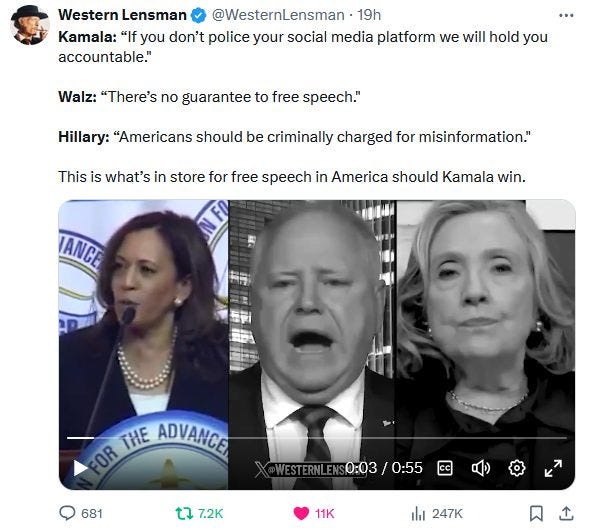In one of the more quotable (and quoted) scenes in Monty Python and the Holy Grail, Dennis, a 37 year old gatherer of filth, frustrates King Arthur with a long-winded explanation of the workings of his anarcho-syndicalist commune. Arthur eventually devolves into a fit of authoritarian rage, and after his repeated orders to shut up are ignored by Dennis, ends with the invective "Bloody peasant!"
To which Dennis replies, "Oh, what a giveaway."
In real-world politics, such moments have been dubbed "Kinsley gaffes," after the eponymous journalist Michael Kinsley, who noted that,
A gaffe is when a politician tells the truth – some obvious truth he isn't supposed to say.
Some such moments have derailed political campaigns and undermined careers. Others don't serve the public quite as well, but still give us a peek behind the green curtain.
As the saying goes, when people tell you who they are, believe them.
John Kerry, whom WSJ editor James Taranto helpfully and frequently described as "the haughty, French-looking Massachusetts Democrat who by the way served in Vietnam," gave us one of those sneak-peeks recently:
If people go to only one source and the source they go to is sick and has an agenda and they’re putting out disinformation, our First Amendment stands as a major block to the ability to be able to just hammer it out.
Kerry, a former US Senator, took an oath to "support and defend the Constitution of the United States against all enemies, foreign and domestic," to "bear true faith and allegiance to the same," and to "take this obligation freely, without any mental reservation or purpose of evasion."
Nowhere in this oath is room for personal preference, or “when I feel like it” exception.
Being elected to public service means just that. Public service. You represent the people who elected you and the system in which that election happened. The Constitution is the supreme law of the land, overriding all other laws, rules, regulations, and the like, and someone in public service is obligated, both via oath and in general, to subordinate his or her own preferences to that law.
Of course, we all know that a great many politicians pay mere lip service to this obligation. For many, especially those of a statist bent, the Constitution is indeed seen as an obstacle. Just look at the Democrats' deep desire to eviscerate the Supreme Court, which exists to enforce the Constitution, for proof.
Kerry is not alone in deeming the First Amendment an obstacle. We are awash in such folks.
There’s no guarantee to free speech on misinformation or hate speech. - Democratic Vice Presidential Candidate Tim Walz
Make no mistake, they are, like Arthur, more interested in making you shut up than in ensuring you don’t get misinformed or disinformed.
Anyone who thinks that the government should create some form of a "Ministry of Truth," whether it be dubbed an effort to prevent misinformation and disinformation or something else, is someone who should not be trusted with public power. We've been hearing versions of this from both sides of the aisle for a long time, but it has really ramped up in intensity the past few years and in the current electoral silly season.
Harris, her cohorts in the White House, her party brethren in Congress, her ideators in academia, and her water carriers in the Press are all of a mind with John Kerry. This belief that they should get to decide what is true, what is false, what is disinformation, and what is misinformation is so prevalent, the question is not "whether" they should intervene, but "how." It is a given that something must be done, with the biggest obstacle being the premise of freedom of speech itself.
To be clear, disinformation is not an exception to the First Amendment. Nor is getting your information from only one source. Nor is lying in general.
Lying in court under oath, aka perjury, is an exception. So are slander, libel, intimidation, and incitement. We already have plenty of existing law to handle those instances. We certainly do not need any more laws in that regard, nor do we need agencies or bureaucracies to police our speech and decide what is fit for public consumption.
It bears noting that Trump isn't exactly a crusader for free speech, either. The Untethered Orange Id, often his own worst enemy, wants to prosecute Google for search results that he claims favor Harris.
Whether they do or not is for the market, aka you and me, to sort it out. Indeed, I have already abandoned Google for searches that I consider political in nature, and use such as DuckDuckGo, Brave, and others in its stead.
The thing is, if Harris wins, the notion of truth ministries will be supported high and low, far and wide, by not just the Kerrys of the country, but by the legacy media (who absolutely should know better), and by academia (whose "we are better" has metastasized into a Stage IV cancer). If Trump wins, then all those liberty-hating beasts will suddenly rediscover the sanctity of the First Amendment, and we will see the Press resume its proper adversarial role. Not great, but a damn sight better than an amok Machine bulldozing our speech.
The fanatics (Kerry included) who hate individual liberty and all that comes with it are never going to change their ways. We aren't going to convince them that the messiness of free speech and a marketplace of ideas that includes the right to lie is better than a handful of Best-and-Brightest deciding what we should all get to hear and read and see. All we can do is do our best to keep the people who have no regard for our freedoms from having so much power over us, for as long as we can, and inform our fellow citizens of the peril of bending the knee to those illiberal thugs.






My favorite line from Holy Grail is when the dead gatherer sees Arthur and says "Must be a king." When asked why he responds "Doesn't have shit all over him."
My state college educated son told me years ago that he didn't believe that the white supremacists shouldn't be allowed to state their views in Charlottesville, I tried in vain to explain to him how the first amendment can't draw lines on what is acceptable and what is not, because of the danger of what that could lead to. He just didn't get that no matter how distasteful others' opinions were, they still had the right to present them, and the rest of us had the right to ignore them.
Great one Peter. Our rights are all under attack, but none more so than the ones protected by the First and Second Amendments. There are too many, not just domestically, but internationally, who wish to see free speech curtailed.
I do agree with Rodney - laws cannot prevent you *saying* something; that would violated the First Amendment. They can, however, punish you for harm caused by what you say. This is where Walz, and so many others, are mistaken in trotting out the "you can't yell fire in a crowded theater" trope. They claim it is a "legal test," but it is not. It is not a test, law, or precedent. Most don't know, it was just something stated by Justice Oliver Wendell Holmes in his written *opinion* (not ruling) on the Schenck v United States (1919) case. You absolutely *CAN* yell fire in a crowded theater - just be prepared to face the consequence if anyone is hurt.
*as a side note, as if to emphasize it for me, Jamal Bowman pulled the fire alarm in the House of Representatives office building and faced no consequences